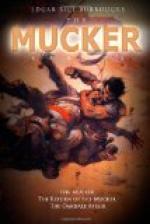“I can go my own way,” he thought, “and not bother her; but I’ll be dinged if I want to croak in this God-forsaken hole—Grand Avenue for mine, when it comes to passing in my checks. Gee! but I’d like to hear the rattle of the Lake Street ‘L’ and see the dolls coming down the station steps by Skidmore’s when the crowd comes home from the Loop at night.”
Billy Byrne was homesick. And then, too, his heart was very heavy and sad because of the great love he had found— a love which he realized was as hopeless as it was great. He had the memory, though, of the girl’s arms about his neck, and her dear lips crushed to his for a brief instant, and her words—ah, those words! They would ring in Billy’s head forever: “I love you, Billy, for what you are.”
And a sudden resolve came into the mucker’s mind as he whispered those words over and over again to himself. “I can’t have her,” he said. “She isn’t for the likes of me; but if I can’t live with her, I can live for her—as she’d want me to live, and, s’help me, those words’ll keep me straight. If she ever hears of Billy Byrne again it won’t be anything to make her ashamed that she had her arms around him, kissing him, and telling him that she loved him.”
At the river’s edge across from the little island Billy came to a halt. He had reached the point near midnight, and hesitated to cross over and disturb the party at that hour. At last, however, he decided to cross quietly, and lie down near her hut until morning.
The crossing was most difficult, for he was very weak, but at last he came to the opposite bank and drew himself up to lie panting for a few minutes on the sloping bank. Then he crawled on again up to the top, and staggering to his feet made his way cautiously toward the two huts. All was quiet. He assumed that the party was asleep, and so he lay down near the rude shelter he had constructed for Barbara Harding, and fell asleep.
It was broad daylight when he awoke—the sun was fully three hours high, and yet no one was stirring. For the first time misgivings commenced to assail Billy’s mind. Could it be possible? He crossed over to his own hut and entered—it was deserted. Then he ran to Barbara’s—it, too, was unoccupied. They had gone!
All during the painful trip from the village to the island Billy had momentarily expected to meet a party of rescuers coming back for him. He had not been exactly disappointed, but a queer little lump had risen to his throat as the days passed and no help had come, and now this was the final blow. They had deserted him! Left him wounded and dying on this savage island without taking the trouble to assure themselves that he really was dead! It was incredible!
“But was it?” thought Billy. “Didn’t I tell them that I was dying? I thought so myself, and there is no reason why they shouldn’t have thought so too. I suppose I shouldn’t blame them, and I don’t; but I wouldn’t have left them that way and not come back. They had a warship full of blue jackets and marines—there wouldn’t have been much danger to them.”




